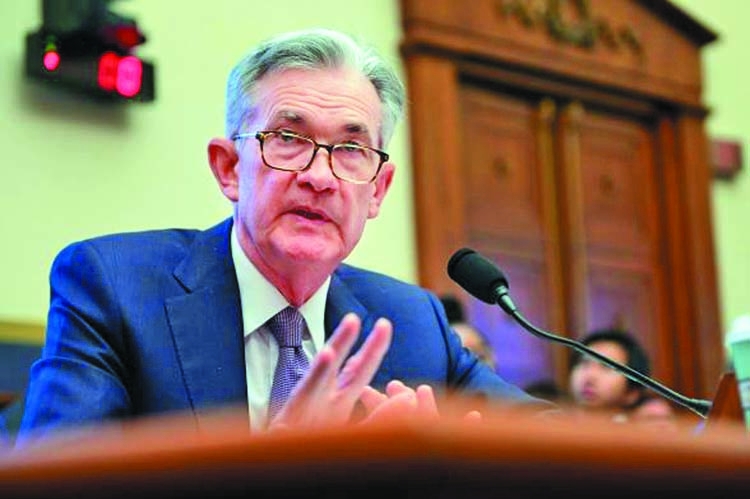Published: 12:34 AM, 12 July 2019
Powell testimony, Fed meeting highlight case for 'insurance'
 Federal Reserve Chairman Jerome Powell testifies during a House Financial Services Committee hearing on "Monetary Policy and the State of the Economy" in Washington, US July 10, this year. -Reuters
Federal Reserve Chairman Jerome Powell testifies during a House Financial Services Committee hearing on "Monetary Policy and the State of the Economy" in Washington, US July 10, this year. -Reuters A confidence shock driven partly by the US trade war is at the center of an increasingly persuasive argument for Federal Reserve policymakers seriously considering cutting rates for the first time in a decade.
Federal Reserve Chairman Jerome Powell on Wednesday set the stage for the rate cut this month, as records from policymakers' latest meeting showed increasing fear that a US-China trade war that has done little to directly restrain growth is indirectly causing businesses to hold back on buying equipment, giving workers a raise and hiking their prices.
Those factors have conspired to pose a serious risk of ending the economic expansion by pushing growth and inflation lower. The Fed is getting closer to lower rates to take out "insurance" that does not happen. Powell used an appearance before his congressional overseers on Wednesday to confirm that the US economy is still under threat from disappointing factory activity, tame inflation and a simmering trade war.
Those are the kinds of uncertainties that "many" policymakers called out as suggesting the need for a rate cut "in the near term," according to records from the Fed's rate-setting meeting, which were released shortly after Powell concluded several hours of testimony before the U.S. House of Representatives Financial Services Committee. "Since then, based on incoming data and other developments, it appears that uncertainties around trade tensions and concerns about the strength of the global economy continue to weigh on the US outlook," Powell said.
At that June 18-19 meeting, some Fed policymakers worried that they may need act to lift inflation that is failing to meet the US central bank's 2% annual target and to combat a pervasive pessimism among corporations that they see holding back business investment. Lower rates could "cushion the effects" of shocks from the trade war, according to the minutes' summary of the case for a cut.
"Powell's really making the case that an insurance rate cut is important so July is looking much more likely despite the fact we had a pretty good jobs report," said Chris Zaccarelli, chief investment officer for Independent Advisor Alliance.
US stocks traded higher, with the S&P 500 briefly crossing the 3,000-point mark for the first time. Short-term bond yields fell, and the US dollar .DXY fell against a basket of other currencies. Powell and the meeting records both shed light on what is concerning the Fed about an economy they concede is still likely to grow.
Powell focused on "broad" global weakness, rather than good news, insisting that pledges by Washington and Beijing in recent weeks to return to the negotiating table to iron out their differences on trade failed to remove uncertainty. "Uncertainties around trade tensions and concerns about the strength of the global economy continue to weigh on the USoutlook," Powell said.
In his testimony, the first installment of two days on Capitol Hill this week, Powell also downplayed a strong June jobs report and dismissed claims that the US labor market is hot. Central banks fight inflation by raising rates when the jobless rate reaches unsustainably low levels, and unemployment is near its lowest levels since 1969. "We don't have any evidence for calling this a hot labor market," Powell told lawmakers. "To call something hot we need to see some heat."
The once-strong connection between low unemployment rates, higher wages and prices has weakened "to the point where it's a faint heartbeat," he said later in the day in response to questioning by Democratic Representative Alexandria Ocasio-Cortez. "We really have learned though that the economy can sustain much lower unemployment than we thought without troubling levels of inflation."
The minutes echoed that sentiment: "several participants pointed out that they had revised down their estimates of the longer-run normal rate of unemployment and, as a result, saw a smaller upward contribution to inflation pressures," and a better case for lower rates.
Powell also cited European and Asian economic data as continuing "to disappoint" and weighing on US growth, the head of the US central bank said. Policymakers also appear to be far more worried about a lack of confidence that is seeping into troubling spending and pricing decisions.
Several Fed policymakers spoke at the latest meeting about how their business contacts are now thinking that trade-war and other uncertainties are hanging over their investment decisions not just now but "over the medium term," according to the minutes. Manufacturers, they said, are putting big spending and hiring plans on hold and reevaluating where and how they build their goods because of the trade war.
The hearing, part of the Fed chief's semi-annual testimony on monetary policy to Congress, took place against the backdrop of US President Donald Trump's frequent criticism of the Fed and the White House's demands that the central bank lower rates.
---Reuters, Washington




